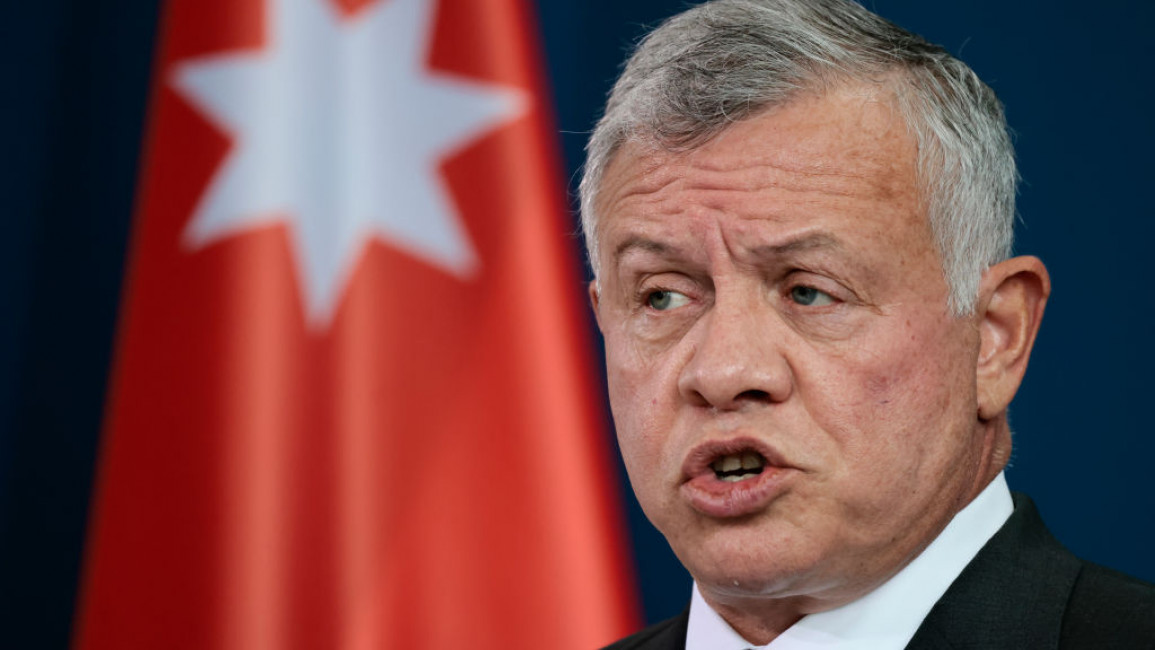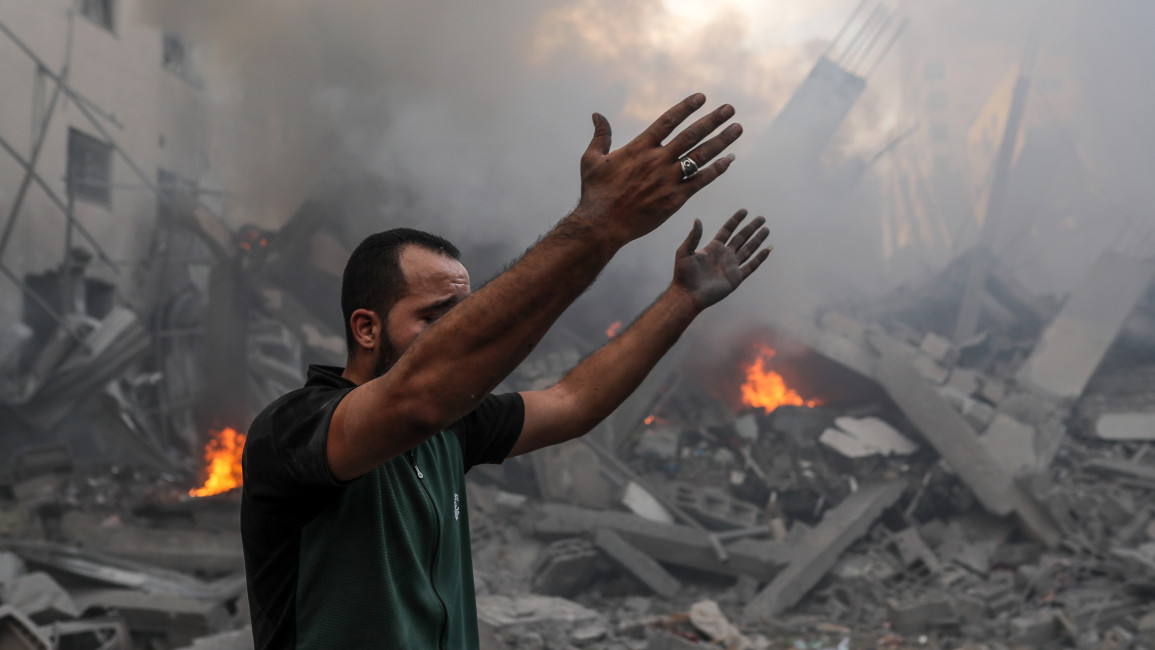
Why Jordan is hardening its stance on Israel's war on Gaza

Over the past decade or so when Israel and Hamas waged war against each other, Jordan has found itself in an uneasy position.
Beyond condemnations and calls for an immediate ceasefire, Amman had little or no leverage.
Relations with Israel, especially under Benjamin Netanyahu, deteriorated a long time ago over repeated Israeli extremist incursions of the Al-Aqsa Mosque compound, the harassment of East Jerusalem's Palestinian residents, a showdown over Sheikh Jarrah evictions, settlement expansion in the occupied West Bank, and threats to annex the Jordan Valley.
On the other hand, Jordan distanced itself from the Islamist Hamas movement a long time ago, when Amman expelled Hamas’ political representatives in the kingdom in 1999 and sent them to Qatar.
"Jordanian diplomacy has never been so active, and for a good reason, too. What happens in Gaza could very well be repeated in the West Bank, forcing millions to seek refuge in Jordan"
Instead, Jordan invested its political assets in President Mahmoud Abbas and the Palestinian Authority (PA) in Ramallah.
King Abdullah had, however, always supported the civilian population of the besieged Gaza Strip, dispatching humanitarian aid and supporting a permanent Jordanian field hospital there.
Other than this though, Jordan largely watched as Egypt, Qatar, and the US played a pivotal role in enforcing ceasefires and negotiating long-term truces between Israel and the Hamas-ruled Gaza Strip.
But the war that was declared by Israel in the wake of the devastating 7 October surprise attack in southern Israel by Hamas’ military wing, which killed 1,400 people and left many more injured, in addition to around 230 hostages taken into Gaza, was different to all previous rounds of fighting.
The extent of the Israeli military response so far has been appalling in terms of the indiscriminate bombardment of civilian targets - a scorched earth policy - and the declared objectives of the war.
This time, Israel wants to destroy Hamas and uproot it from Gaza, create a vast buffer zone in the northern part of the strip, and reportedly force 2.3 million residents to move south and into the Egyptian Sinai, in what would amount to forced transfer.
And Israel was not mincing its words. It ordered a complete termination of electricity, fuel, food, and water supplies to Gaza - clear war crimes. It abandoned a previous policy of warning residents of buildings to evacuate minutes before carrying out devastating aerial strikes.
It mobilised hundreds of thousands of reservists and shelled towers, houses, medical facilities, mosques, churches, and cemeteries and targeted emergency staff, ambulances, bakeries, and gas stations. This was no ordinary revenge operation, but seemingly an attempt to kill as many people as possible while forcing hundreds of thousands to flee.
This time, Jordan’s reaction has been qualitatively different. King Abdullah stepped in early on to call for an immediate ceasefire, warning of an unfolding humanitarian catastrophe. He flew to Cairo to coordinate positions with Egypt’s Abdel Fattah el-Sisi and later received President Abbas in Amman.
|
|
What shocked Jordan the most was the unabashed position of its Western allies, from US President Joe Biden and British Prime Minister Rishi Sunak to European Commission President Ursula von der Leyen and others.
Their response was the same: Israel had a right to defend itself. There was no mention of the humanitarian catastrophe that was unfolding in Gaza or the dangerous claim by Israel that it wanted to displace millions.
As Jordanians protested in the tens of thousands in support of Gaza, calling for the closure of the Israeli embassy and termination of the peace treaty between Jordan and Israel, the King took the risky decision to cancel a meeting that Biden was to hold with the king, Sisi, and Abbas in Amman following his return from Tel Aviv, where he was to show solidarity with Israel and extend all possible military support to its war on Gaza.
The king’s decision angered the Americans, Jordan’s closest financial and military backer. However, the king sensed that the Amman meeting would undermine his position and that of Arab countries. Biden would use the meeting to whitewash Israeli crimes in Gaza, without offering a political way out to end the crisis.
"For decades, extremist Israeli politicians have referred to Jordan as Palestine; the Jordan-is-Palestine option. Once on the margins of Israeli politics, when Netanyahu formed the most far-right government in Israel's history alarm bells began sounding in Amman"
The king flew to London, Rome, and Berlin to meet with officials there and press for an immediate ceasefire and allow the unfettered flow of humanitarian aid. He did not like what he heard from these officials.
And then he went to Cairo to attend a peace conference that Sisi had called for, bringing together Arab, Muslim, and Western leaders and officials. A serious and sombre-looking King Abdullah delivered the most powerful speech of his 24-year reign. The king spoke of the relentless bombing campaign underway in Gaza, describing it “as cruel and unconscionable - on every level”.
He pointed to the collective punishment of besieged and helpless people, adding that it is a flagrant violation of international humanitarian law and a war crime.
Then he highlighted, without naming Ukraine, the double standards used by the West. “Anywhere else, attacking civilian infrastructure and deliberately starving an entire population of food, water, electricity, and necessities would be condemned. Accountability would be enforced, immediately, unequivocally. And it has been done before - recently, in another conflict,” he said.
Lamenting the global silence on what was happening in Gaza, the king said that “the message the Arab world is hearing is loud and clear: Palestinian lives matter less than Israeli ones. Our lives matter less than other lives. The application of international law is optional. And human rights have boundaries - they stop at borders, they stop at races, and they stop at religions.”
This, he added, is a “very, very dangerous message, as the consequences of continued international apathy and inaction will be catastrophic—on us all”.
It was the most scathing reprimand of the West's hypocrisy and double standards regarding the Palestine Question from an Arab leader in a long time.
In an interview with CNN, Queen Rania departed from diplomatic tactfulness to accuse the West of “glaring double standards,” adding that Israel, as an occupying power, does not have the right to defend itself. The interview went viral across the globe.
When the UN Security Council failed, twice, to adopt a resolution calling for a ceasefire, Jordan sponsored an Arab draft resolution that was presented to an extraordinary session of the UN General Assembly. Despite Israeli protests, the symbolic, non-binding resolution passed with 120 states voting for it.
|
|
Jordanian diplomacy has never been so active, and for a good reason, too. What happens in Gaza could very well be repeated in the West Bank, forcing millions to seek refuge in Jordan.
That ominous scenario, if it happens, will be detrimental to Jordan and poses an existential threat. Jordan will not allow Israel to export its occupation problems to its neighbours.
For decades, extremist Israeli politicians have referred to Jordan as Palestine; the Jordan-is-Palestine option. Those politicians were on the margins of Israeli politics, but when Netanyahu formed the most far-right government in Israel’s history late last year, alarm bells began sounding in Amman.
Until 7 October, Israel paid no attention to Jordan’s official protests of Israeli policies regarding Al-Aqsa Mosque, where the king is the custodian, or to the sidelining of the PA while the Israeli cabinet approved the confiscation of more Palestinian lands in the West Bank.
"What shocked Jordan the most was the unabashed position of its Western allies, from US President Joe Biden and British Prime Minister Rishi Sunak to European Commission President Ursula von der Leyen and others"
Jordan’s attempt to put pressure on Netanyahu, through the Americans and Europeans, led nowhere. The two-state solution was crumbling before the king’s eyes, making Jordan as an alternative Palestinian state more likely.
The likes of Israeli Finance Minister Bezalel Smotrich and National Security Minister Itamar Ben-Gvir - both ultranationalists - openly challenged Jordan over Al-Aqsa and settlement expansion in the West Bank.
The situation in the West Bank has been deteriorating quickly, and the PA is potentially on the verge of collapse. Smotrich has openly talked about giving Palestinians in the West Bank three options: get killed, bow down, or be forced out, to Jordan.
Adding to the king’s qualms were reports that the US was brokering a normalisation deal between Israel and Saudi Arabia. Jordan was running out of diplomatic options as the regional geopolitical scene was about to change dramatically.
The 7 October attack by Hamas and Israeli excessive response could be a game changer, a hefty one indeed, with thousands of Palestinians in Gaza losing their lives. The transfer scenario is the most audacious one that Israel might attempt to implement in Gaza since the Nakba of 1948. Jordan cannot allow that to happen, and thus, its reaction has been strong, and risky.
While Israel’s war on Gaza rages on, global public opinion has shifted dramatically. “Free Palestine” has become a rallying cry for millions around the world, putting tremendous pressure on Western governments and politicians.
Jordan is hoping that such pressure will force Israel to alter its declared objectives in Gaza and abandon the forced displacement scenario.
More importantly, Jordan is hoping that once the dust settles in Gaza and the world sees the horrific images of the destruction of life and infrastructure there, efforts to revive the peace process and restore credibility to a dysfunctional world order will pick up pace and bring an end to Israeli impunity.
Osama Al Sharif is a journalist and political commentator based in Amman.
Follow him on Twitter: @plato010




